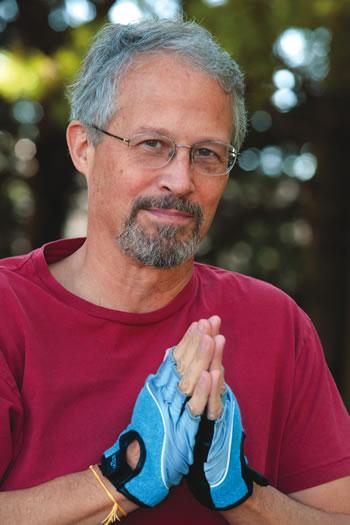Dickinson College
Whacked
The Last Word
by Dan Cozort
Dan Cozort's explorations of Indian religions and special interest in meditation theory and practice have served him well as he recuperates.
“Everybody gets whacked. That’s a fact.” My best friend’s rhyme resonates with me. It reminds me that adversity comes to all of us eventually. Some of us are born whacked. Or we are whacked by cancer, multiple sclerosis, the loss of a loved one, personal violence, mental disorders, falling down steps, aneurisms … the list goes on, endlessly. We are all, always, susceptible to catastrophe.
My number came up on a July morning, when I was out on my bicycle doing my usual 50-minute circuit on rural roads south of Carlisle. I was hit head-on by a car that crossed into my lane. My brain and major organs were not damaged, but my spine was severely fractured, leaving the lower half of my body paralyzed. I got whacked, and that’s a fact. Now what?
Oddly, I wasn’t surprised. I knew that road biking meant I might get clipped someday. Someone made a mistake. We all make mistakes. I was in the wrong place at the wrong time. I was not angry. I was not even particularly sad. I felt lucky to be alive.
But the Darkness lurks. Pain is a constant companion. Infections crop up. Anxiety about the future disturbs even drugged dreams. What keeps the Darkness at bay is something unexpected, a tsunami of love and support from people from all the times and places of my life: North Dakota, where I grew up; Providence and Charlottesville, where I studied; India and England, where I directed study programs; but most of all, from Carlisle, which has been my home since I came to Dickinson 23 years ago. The daily messages of love and sympathy from schoolmates, friends, family, colleagues, students and alumni have amounted to a precious gift—the knowledge that my life has meaning to others.
I always have felt lucky to have landed at Dickinson. I’ve appreciated its physical beauty and historic buildings, its ever-more-brilliant faculty, its crafty leadership; but even more, I’ve treasured the chance to try new things, dream up new courses, teach abroad and bring an assortment of Buddhist monks, Indian dancers, Native-American drummers and spiritual seekers to campus.
My recent experience has reminded me that Dickinson is, more than anything else, its people. Within hours of my accident, I heard words of encouragement from President William G. Durden ’71 and reassurance from Provost Neil Weissman, telling me not to worry, that I could come back to teach whenever I was ready.
Cards, e-mails, fruit and flowers began to arrive from my colleagues, current and emeriti, but also from staff in the mail room, from the library, from the registrar’s office, in various departments all over campus, many from people I scarcely knew or didn’t know at all but who felt that I was part of their Dickinson family. Best wishes and flowers came from the Research and Development Committee and from the philosophy department. People visited at the rehab hospital, bringing books, delicious treats and their good company. Eleanor Mitchell, director of library services, supplied me with DVDs and other requested materials.
My colleagues in the religion department and our majors partnered with Bonnie Berk, community-wellness guru. In September, they organized a yoga-centered fundraiser in the HUB that raised money to help me with expenses that my insurance will not cover. I’m told the doors in East College are being fitted with automatic openers, and my classroom there will get new equipment for a wheelchair-bound professor. Most important for me, an apartment in a Dickinson-owned house will probably become my new home next summer, after modifications for my disabilities are made by the college.
I have experienced directly the healing power of a real community, one that cares about its members.
Since the accident, my wounds and bones have healed, and I have gotten much stronger. I can now put on my clothes, get out of bed and into a wheelchair and, from there, move to a car seat. Soon I will leave the hospital and go to an apartment designed for a handicapped person, and I will forge a new way of living.
In the spring, I will come back to Dickinson to see what it is like to teach from a wheelchair. The course is one I have taught twice before, but, this time, I suspect it will have additional meaning for me and for my students. Somewhat of a survey of the history of medicine and religion, it is called Spiritual Dimensions of Healing.
Associate Professor of Religion Dan Cozort is editor of the Journal of Buddhist Ethics.
Published January 2, 2012